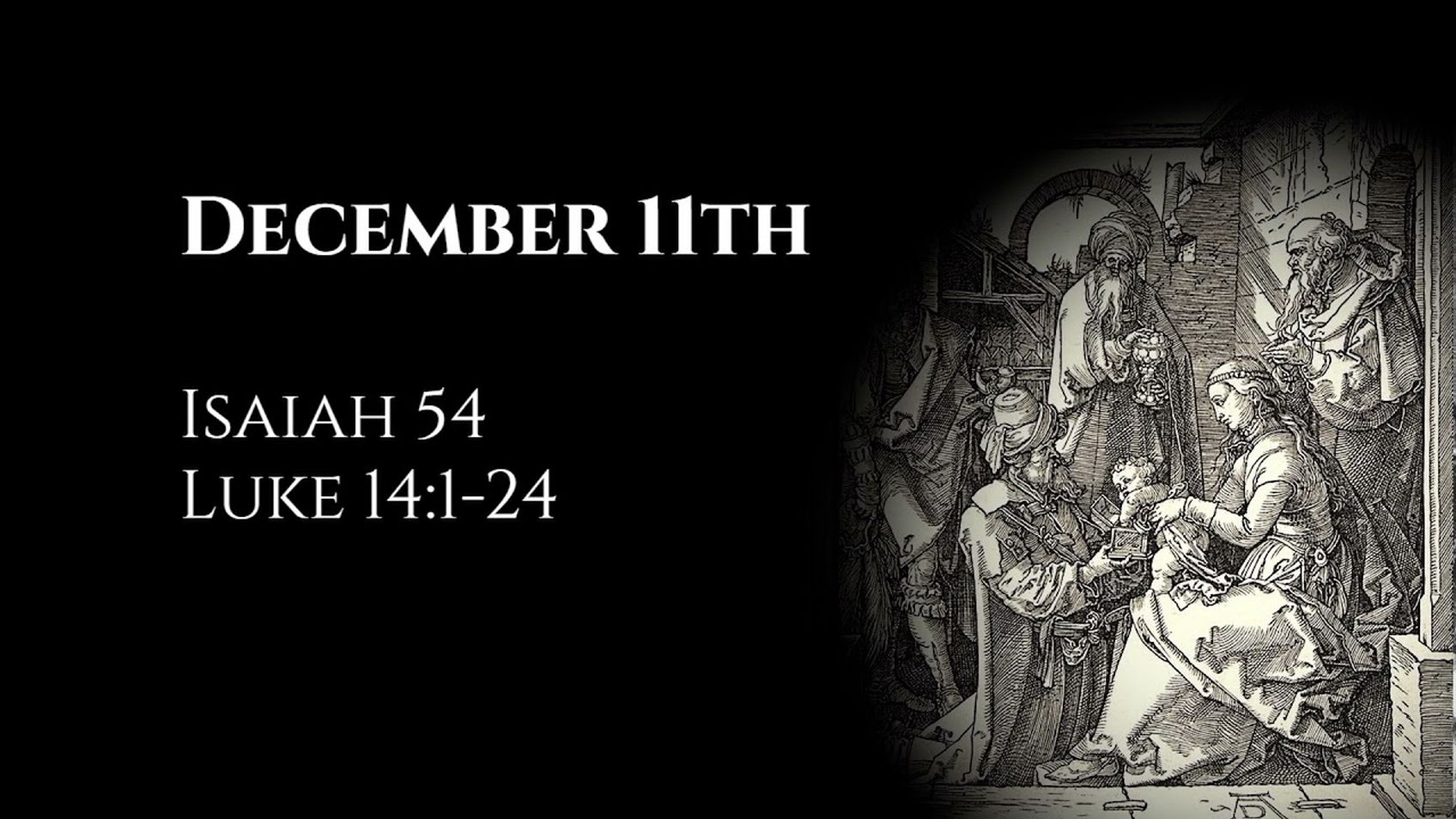December 11th: Isaiah 54 & Luke 14:1-24
December 10, 2021

Alastair Roberts
Zion restored. The Parable of the Great Banquet.
My reflections are searchable by Bible chapter here: https://audio.alastairadversaria.com/explore/.
If you are interested in supporting this project, please consider supporting my work on Patreon (https://www.patreon.com/zugzwanged), using my PayPal account (https://bit.ly/2RLaUcB), or buying books for my research on Amazon (https://www.amazon.co.uk/hz/wishlist/ls/36WVSWCK4X33O?ref_=wl_share).
You can also listen to the audio of these episodes on iTunes: https://itunes.apple.com/gb/podcast/alastairs-adversaria/id1416351035?mt=2.
More From Alastair Roberts
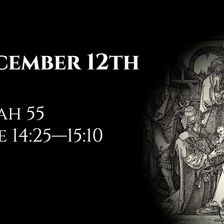
December 12th: Isaiah 55 & Luke 14:25—15:10
Alastair Roberts
December 11, 2021
Come to the waters! The Parables of the Lost Sheep and the Lost Coin.
My reflections are searchable by Bible chapter here: https://audio.alastairadve
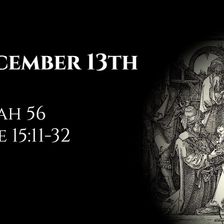
December 13th: Isaiah 56 & Luke 15:11-32
Alastair Roberts
December 12, 2021
The foreigner and eunuch who keep my Sabbath. The Parable of the Lost Son.
My reflections are searchable by Bible chapter here: https://audio.alastai
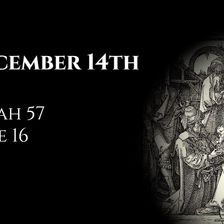
December 14th: Isaiah 57 & Luke 16
Alastair Roberts
December 13, 2021
Israel's idolatry. The Parables of the Unjust Steward and the Rich Man and Lazarus.
My reflections are searchable by Bible chapter here: https://audi
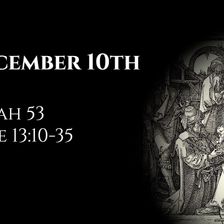
December 10th: Isaiah 53 & Luke 13:10-35
Alastair Roberts
December 9, 2021
The suffering Servant. Parables of Leaven and Mustard Seed and lament over Jerusalem.
My reflections are searchable by Bible chapter here: https://au
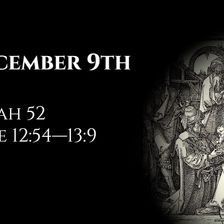
December 9th: Isaiah 52 & Luke 12:54—13:9
Alastair Roberts
December 8, 2021
How beautiful upon the mountains are the feet of him who brings good news. Knowing the times.
My reflections are searchable by Bible chapter here: ht
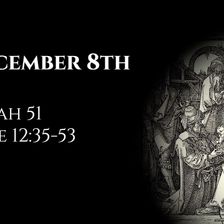
December 8th: Isaiah 51 & Luke 12:35-53
Alastair Roberts
December 7, 2021
The Lord, the comforter of Zion. Being prepared for the coming of the Son of Man.
My reflections are searchable by Bible chapter here: https://audio.
More on OpenTheo

Why Do We Say Someone Was Saved on a Particular Date If It Was Part of an Eternal Plan?
#STRask
November 24, 2025
Questions about why we say someone was saved on a particular date if it was part of an eternal plan, the Roman Catholic view of the gospel vs. the Bib

Kingdom Priorities: Following the Teachings of Jesus
Knight & Rose Show
February 14, 2026
Wintery Knight and Desert Rose discuss Jesus' teachings from the Gospels, emphasizing truth, evidence, self-denial, and forgiveness. They explore pass

An Invitation to the 2026 Coram Deo Pastors Conference
Life and Books and Everything
February 18, 2026
"I love being a pastor, and I love pastors, which is why I hope you will consider joining us at the Coram Deo Pastors Conference in 2026." —Kevin DeYo

Conservatism and Religious Freedom with John Wilsey
Life and Books and Everything
October 27, 2025
What is conservatism? And why does it go hand in hand with religious freedom? How should we think about the American experiment of ordered liberty? Ha

Lora Ries: Border Security and Immigration Policy
Knight & Rose Show
December 7, 2025
Wintery Knight and Desert Rose welcome Lora Ries to discuss border security and immigration policy. They explore Biden's policy changes, like ending R

Can Two Logical People Come to Conflicting Conclusions Without Committing a Fallacy?
#STRask
January 8, 2026
Questions about whether two logical people can come to conflicting conclusions on a topic without committing a fallacy, how Greg, as a public figure,

Did Jesus Prove He Wasn’t Sinless When He Overturned the Tables?
#STRask
December 29, 2025
Questions about whether Jesus proved he wasn’t sinless when he overturned the tables, whether Jesus’ response to the Pharisees in Mark 3:22–26 was a b

The Making of the American Mind with Matthew Spalding
Life and Books and Everything
February 2, 2026
The United States is unique in how much attention it pays to its founding, its founders, and its founding documents. Arguably, the most famous and mos

Why Would Any Rational Person Have to Use Any Religious Book?
#STRask
December 8, 2025
Questions about why any rational person would have to use any religious book, whether apologetics would be redundant if there were actually a good, un

How Do You Justify Calling Jesus the Messiah?
#STRask
December 18, 2025
Questions about how one can justify calling Jesus the Messiah when he didn’t fulfill the Hebrew messianic prophecies, and whether the reason for the v

What Are Some Good Ways to Start a Conversation About God with Family Members?
#STRask
October 30, 2025
Questions about how to start a conversation about God with non-Christian family members, how to keep from becoming emotional when discussing faith iss

What About Those Who Never Heard the Name of Jesus?
#STRask
December 22, 2025
Questions about what will happen to those who never heard of Jesus or were brought up in a different faith, whether there’s biblical warrant to think

Are You Accursed If You Tithe?
#STRask
December 15, 2025
Questions about whether anyone who tithes is not a Christian and is accursed since Paul says that if you obey one part of the Mosaic Law you’re obliga

Christmas Cranks and Christmas Blessings with Justin Taylor and Collin Hansen
Life and Books and Everything
December 17, 2025
If you are looking for a podcast where three friends talk about whatever they want to talk about and ramble on about sports, books, and grievances, th

How Can I Explain Modesty to My Daughter?
#STRask
November 27, 2025
Questions about how to explain modesty to a nine-year-old in a way that won’t cause shame about her body, and when and how to tell a child about a pre
